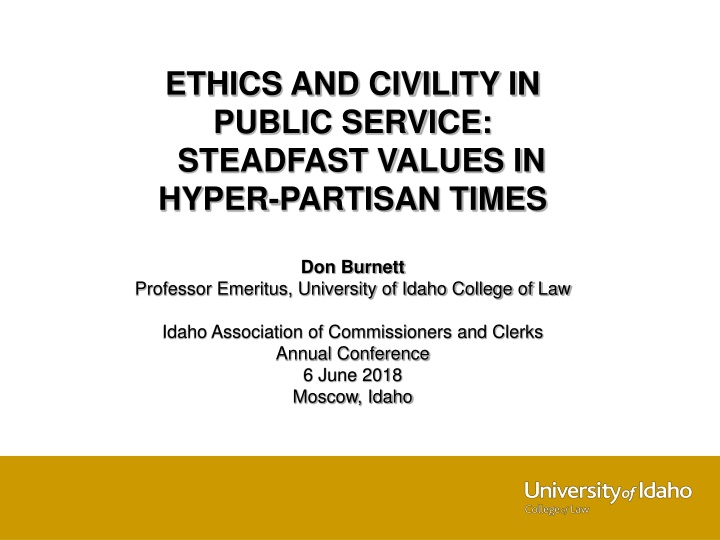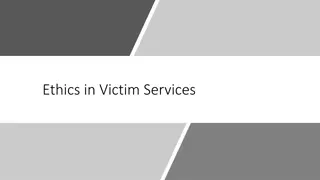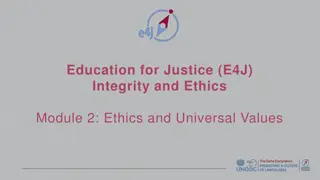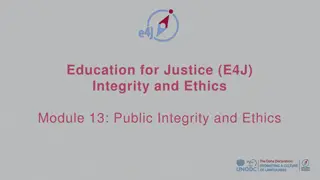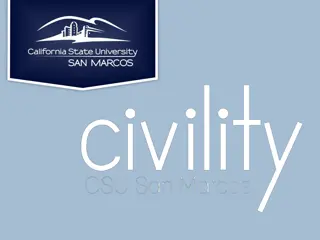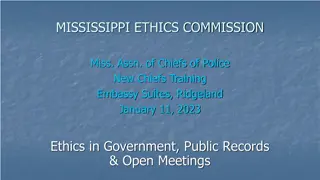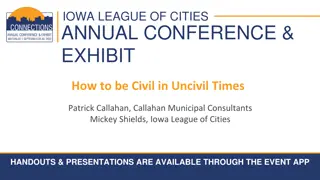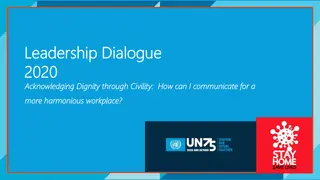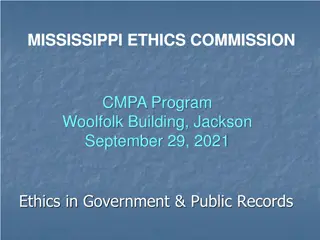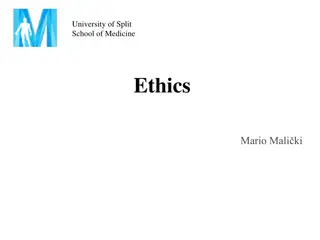Ethics and Civility in Public Service: Upholding Steadfast Values
In a hyper-partisan world, Don Burnett emphasizes the importance of ethics, morality, and civility in public service. He delves into the foundation of trust, shared ethical values, and the elements of the rule of law that are essential for a well-functioning government. The connection between ethics, morality, and leadership is explored, highlighting the significance of respect for colleagues and citizens in maintaining ethical leadership.
Uploaded on Sep 06, 2024 | 2 Views
Download Presentation

Please find below an Image/Link to download the presentation.
The content on the website is provided AS IS for your information and personal use only. It may not be sold, licensed, or shared on other websites without obtaining consent from the author.If you encounter any issues during the download, it is possible that the publisher has removed the file from their server.
You are allowed to download the files provided on this website for personal or commercial use, subject to the condition that they are used lawfully. All files are the property of their respective owners.
The content on the website is provided AS IS for your information and personal use only. It may not be sold, licensed, or shared on other websites without obtaining consent from the author.
E N D
Presentation Transcript
ETHICS AND CIVILITY IN PUBLIC SERVICE: STEADFAST VALUES IN HYPER-PARTISAN TIMES Don Burnett Professor Emeritus, University of Idaho College of Law Idaho Association of Commissioners and Clerks Annual Conference 6 June 2018 Moscow, Idaho
A Republic, If A familiar story from Philadelphia, 1787 A telling tete-a-tete between Prince Philip and Thurgood Marshall Government close to the people: The ordinary administration of criminal and civil justice contributes, more than any other circumstance, to impressing upon the minds of the people affection, esteem, and reverence toward the government. - Alexander Hamilton, Federalist No.17
Consent of the Governed Is Built on Trust and trust is built upon a shared set of ethical values: Adherence to the rule of law (as distinguished from the law of rulers ) Conduct rooted in moral principle rather than personal advantage Respect for colleagues in government as well as for democracy s highest official the citizen
Elements of the Rule of Law Government officials, private individuals, and public and private entities are all accountable under the law Laws are clear, publicized, stable, just, and applied evenly (No tickets for one train only ) Processes by which laws are enacted, administered, and enforced are accessible, fair, and efficient Justice is delivered by competent, ethical, and independent officers
Ethics and Morality Morality undergirds character and like a gyroscope -- gives direction to the exercise of skill and technical competence Technique without values is a menace; values without technique are a mess. (Karl Llewellyn) Ethics is the tissue connecting morality and the actions of a leader
Respect for Colleagues and Citizens Ethical leadership encompasses civility as both a skill and a value Divorced from ethics, leadership is reduced to management, and politics to mere technique. (James MacGregor Burns) Civility is not a tactic or a sentiment. It is the determined choice of trust over cynicism, of community over chaos. (George W. Bush) [A]cts of civility and incivility constitute the heart of morality. (Michael Brannigan)
Civility is not a requirement to abandon one s own thoughtfully developed views; rather, it requires due respect for the civilly expressed views of others. the absence of disagreement; rather, in an open and democratic society, respectful disagreement (without being disagreeable) is healthy. orthodoxy or political correctness; rather, civility promotes and enhances free speech. (Kent M. Weeks, Doing Civility)
Civility and Effectiveness Incivility creates inefficiency. For example, in the administration of justice: Uncivil, abrasive, hostile or obstructive conduct impedes the fundamental goal of resolving disputes rationally, peacefully, and efficiently. Incivility tends to delay, and often deny, justice. (Idaho Court Standards for Civility in Professional Conduct)
Civility and Effectiveness Another example -- healthcare: There are jerks in the world. There are jerks at work. As managers and leaders we are obligated to insure that people have a healthy environment in which they can be nurtured and grow. Patient safety cannot be compromised because we allow jerks to create chaos. This is a serious issue that is very expensive in terms of the toll it takes on people, patients, and the organization. (K.M. Kerfoot, Leadership, Civility, and the No Jerks Rule)
Contexts of Ethics in County Government Selected Recurring Issues Fiduciary duties The public trust Financial management Conflicts of interest Acknowledgements: o Continued thanks to Idaho Deputy Attorney General Brian Kane for developing this general framework in his prior presentation[s] to the Idaho Association of Counties. o See generally, Office of the Attorney General, Idaho Ethics in Government Manual (July, 2015) and any updates
Fiduciary Duties A fiduciary is a person in an office or role that requires him/her to put the interests of others (the beneficiaries) ahead of his/her own personal or family interests. A fiduciary must Exercise highest level of care and diligence Demonstrate full loyalty to the beneficiaries Comply strictly with applicable laws
A Fiduciarys Level of Care and Diligence Equivalent to the care a reasonably prudent person would exercise in conducting his/her own business or personal affairs. Includes Regular attendance at meetings Thorough preparation on issues Decisions made in the county s best interests
A Fiduciarys Duty of Loyalty Loyalty is to the county that is, to the people of the county as a whole. Politics may place an individual in a fiduciary position; but politics does not then dictate his/her conduct in that position. Conflicts of interest are disclosed and managed in the public interest. Observation: A best practice is to require a disclosure of relevant interests, and then to obtain independent evaluation of whether those interests are conflicting and, if so, how they should be managed.
A Fiduciarys Duty of Compliance Must work to fulfill the mission(s) of county governmental entities, as stated in statutes, and organizational articles or bylaws Must conform one s own individual conduct strictly to the law, including court decisions Must be transparent in decisions made and actions taken pursuant to law
Public Office as a Trusteeship: Idaho Code Section 59-702 It is hereby declared that the position of a public official at all levels of government is a public trust and it is in the public interest to: (1) Protect the integrity of government throughout the state of Idaho while at the same time facilitating recruitment and retention of personnel needed in government; [continued]
I.C. 59-702 continued (2) Assure independence, impartiality, and honesty of public officials in governmental functions; (3) Inform citizens of the existence of personal interests which may present a conflict between an official s public trust and private concerns; (4) Prevent public office from being used for personal gain contrary to the public interest; [continued]
I.C. 59-702 further continued (5) Prevent special interests from unduly influencing governmental action; and (6) Assure that governmental functions and policies reflect, to the maximum extent possible, the public interest. --- Observation: This statute captures the spirit of public service as a noble undertaking in Idaho.
Implementing the Public Trust Requires openness to public participation as provided by law, and respectful treatment of all participants Entails rigorous accountability of public officers, including oversight of superior/subordinate relationships Embodied in clear, understandable policies consistently followed Reinforced through planning and training
Financial Management Avoiding the temptation to defraud the state of honest services (in various forms punishable as a felony under I.C. title 18) o Root out bribery and corrupt practices, and hold others accountable to do the same o Do not enter public service, or counsel others to enter public service, to make money or be the boss
Financial Management (continued) Adopt (with variations as required for local circumstances) and adhere to the Idaho Association of Counties Policy and Procedures Manual on Financial Management and Ethical Practices for County Elected Officials and County Employees Read and comply with Idaho Constitution Article VII, Section 10 Making Profit from Public Money Prohibited
Financial Management (contd) Illustrative statutes: I.C. 18-5701 Misuse of Public Money by Officers I.C. 18-1351 through 18-1362 (bribery and corrupt practices) o Cannot take gift of $50 (I.C. 18-1356) or more in value, unless from family or friend -- that is, friendship arising for reasons other than official position) o Cannot receive compensation for consultation or assistance on matters relating to official duties
Financial Management (contd) Cannot use official position for personal gain or gain of family members within 2d degree of consanguinity see chart in Idaho Ethics in Government Manual oThere are narrow exceptions in I.C. 18-1361, 1361A; and a definition of remote interests under I.C. 59-201A. Cannot buy property belonging to government entity in which individual holds a position County commissioners must be disinterested: I.C. 31-807A; see also I.C. 31-4504, 4905 regarding solid waste and pollution control financing
Conflicts of Interest Must be identified and addressed as provided in I.C. 59-704 Threshold question: Is there a private interest (including my own or my family) that would be advanced by a decision or action that I am contemplating? - More than a de minimis interest or the common interest of any other member of the general public
A Word to the Wise There are two courts in which ethical issues may be examined: Court of law a structured forum of legal inquiry and analysis, with protection of due process Court of public opinion an unstructured forum of perception and reaction o Political epithets and hyperbole against the actions of public officials are within the freedom of expression protected by the First Amendment. See, e.g., Weeks v. M-P Publications, Idaho Supreme Court, 95 Idaho 634 (1973) o A (possibly apocryphal) tale from the deep South about a county sheriff and a newspaper editor
Parting Thoughts Ethics: Be alert, not only to actual issues, but also to apparent issues. Appearances critically affect the people s trust in their government. Preserving that trust is the core responsibility of ethical leadership. Civility: o Years ago on my radio show, I used to say, I m a conservative, but I m not in a bad mood about it. I ve always believed that civility in heavy doses is essential in self-government. (Mike Pence) o Reacting in anger or annoyance will not advance one s ability to persuade. (Ruth Bader Ginsburg)
